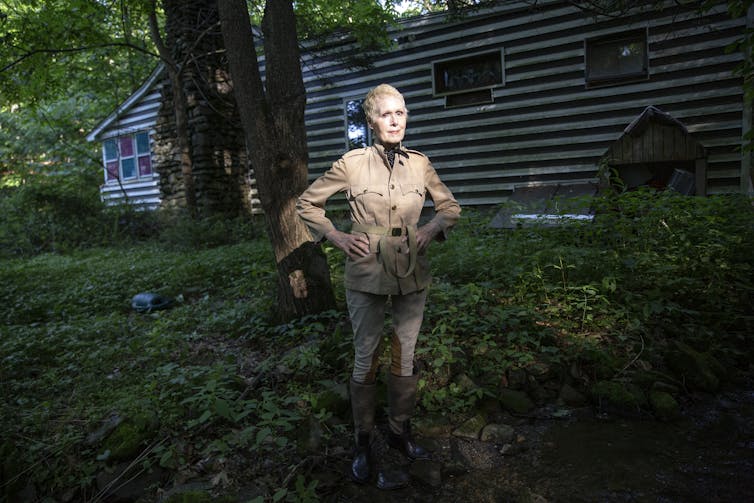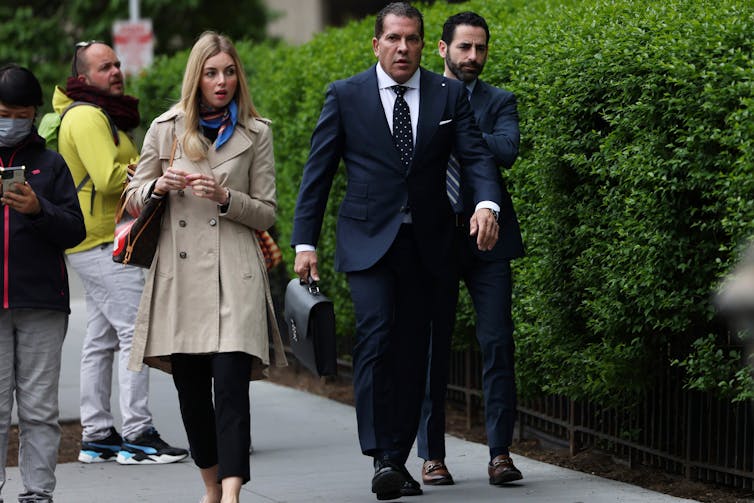Anne P. DePrince, University of Denver
A Manhattan jury has found that former President Donald Trump sexually abused journalist E. Jean Carroll in the 1990s and defamed her by saying that she had lied about the assault. The jury, which announced its verdict on May 9, 2023, awarded Carroll US$5 million in damages.
Trump’s legal team ended its closing arguments in his rape trial on May 8 by saying that Carroll was lying about the alleged decades-old assault.
Carroll filed a lawsuit in 2022, claiming that Trump had raped her and then defamed her with his denials.
Trump has always denied that the encounter with Carroll ever took place.
While cross-examining Carroll, Trump’s attorney, Joseph Tacopina, suggested she only came forward with her allegations, in 2019, “because of her disdain for Trump’s politics and because she wanted to sell copies of her book.”
Tacopina also asked Carroll, 79, why she did not scream, call the police or recall the date and time of the alleged assault, which she says took place in a Bergdorf Goodman department store dressing room in Manhattan in 1996.
“I’m telling you, he raped me, whether I screamed or not,” Carroll said in court on April 27.
As a researcher who has studied violence against women for more than two decades, I can tell you that this line of questioning reinforced common myths about sexual assault that have been perpetuated in other high-profile sexual assault cases, such as those of comedian Bill Cosby and Hollywood mogul Harvey Weinstein.
It’s a common refrain, but one without merit.

Myths about responses to sexual assault
Over several decades, researchers have documented myths about sexual assault – referred to as rape myths – that are both common and persistently held.
Like the line of questioning directed at Carroll, rape myths imply that “real” sexual assault can be distinguished from false accusations based on how women responded to the assault.
For example, myths that “real” victims will fight back and call the police right away are common. Rape myths are so prevalent that they can even be detected among people with training on sexual assault, such as law enforcement officers and crime lab personnel. In turn, rape myths have serious consequences for decision-making in cases, even in terms of whether or not cases are dismissed.
Contrary to myths, though, people respond in diverse ways when they experience traumatic events, including sexual assault. Certainly, some people fight back, as Carroll testified she did. However, other people may appear conciliatory or passive. The range of responses that people have during traumatic events, referred to as flight, fight or freeze, can be affected by automatic processes, such as stress hormones that are released in response to threat.
People also vary in how they act after sexual assault, such as whether or not they call the police or seek medical care. Carroll testified on May 2, regarding her behavior, saying, “Women like me were taught and trained to keep our chins up and to not complain.”
“The fact that I never went to the police is not surprising for someone my age,” said Carroll, who was about 52 years old at the time of the alleged assault.
It’s actually not surprising for women of many ages. Indeed, a vast majority of rapes go unreported to law enforcement, even though people may disclose what happened to friends, family or other informal support people in their lives.
Myths about responses to disclosure
Women have many reasons for disclosing – or not disclosing – sexual harassment and assault, including to try to prevent others from being harmed, find safety or get help.
After all, research shows that sexual assault can take a serious toll on all aspects of survivors’ lives, from their physical and psychological health to their careers and education. Despite the costs to survivors, those who seek monetary compensation are often met with suspicion.
In 2015, a team of researchers considered responses to sexual assault in a court setting by asking mock jurors to read nearly identical summaries of a sexual assault trial.
The descriptions were the same, except for one important detail: About half of the participants also learned that the victim had filed a civil case to try to get monetary compensation. The mock jurors who read about the civil suit were less likely to say they would convict the defendant.
They also perceived the defendant as more credible, and the victim less so, seeing her instead as greedy and manipulative.

Women rarely lie about sexual assault
People routinely question women’s credibility when they disclose sexual harassment and assault, and imply that women lie about assault.
However, evidence consistently shows that false reports of sexual assault are exceedingly rare. For example, two different research teams analyzed sexual assault reports made to the Los Angeles Police Department and a large university police department. Using careful criteria for coding allegations and evidence, the teams estimated that only 4.5% to 5.9% of cases were false.
Yet, the vast majority of sexual assault cases reported to law enforcement do not result in convictions. According to research funded by the National Institute of Justice, only about 6% of sexual assault cases reported to the police led to a determination of guilt.
In 2017, when my research team interviewed more than 200 women who were sexually assaulted, we discovered that friends and family commonly responded to disclosures with negative reactions. They treated survivors differently, focused on how the assault affected them instead of the survivors, took control away from survivors and even blamed survivors for the assaults.
In 2019, when another research team pulled together 51 studies like ours on reactions to women’s disclosures, they found a consistent pattern – women who got more negative reactions when they disclosed their assaults had worse mental health outcomes, such as more severe post-traumatic stress disorder symptoms. This pattern suggests that when women disclose, they are trying to get help and support.
When those hopes for support are dashed by negative reactions instead, women’s psychological pain is worse.
Carroll put it this way as she described the impact of negative reactions to her disclosure: “It hit me and it laid me low because I lost my reputation. Nobody looked at me the same. It was gone. Even people who knew me looked at me with pity in their eyes, and the people who had no opinion now thought I was a liar and hated me.”
This is an update to an article originally published on May 9, 2023.
Anne P. DePrince, Professor of Psychology, University of Denver
This article is republished from The Conversation under a Creative Commons license. Read the original article.






